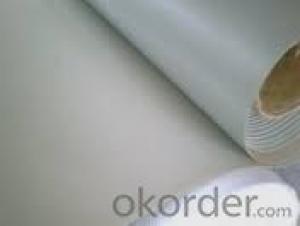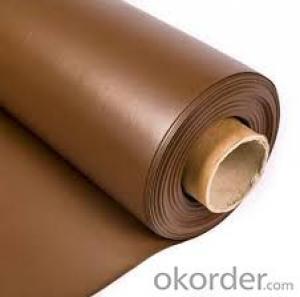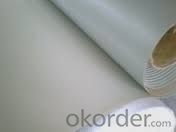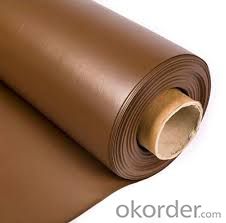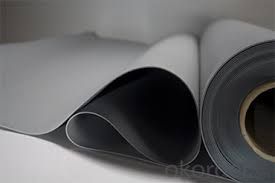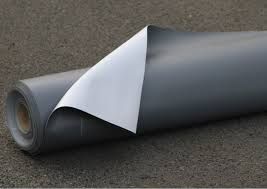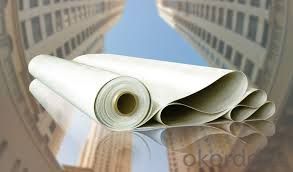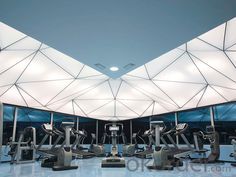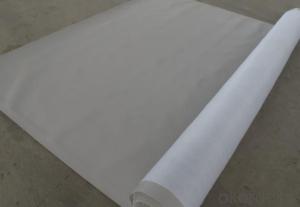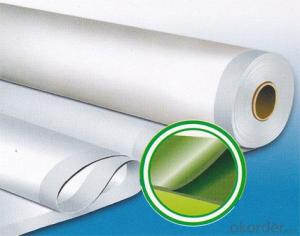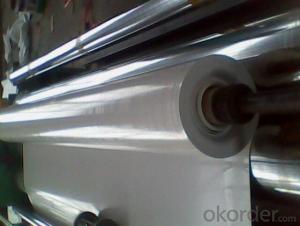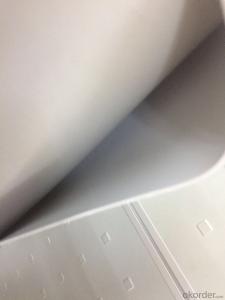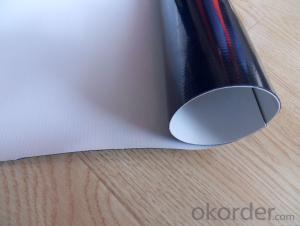High Quality PVC Waterproof Membrane About 1.5mm Thickness
- Loading Port:
- Tianjin
- Payment Terms:
- TT OR LC
- Min Order Qty:
- 2000 m²
- Supply Capability:
- 10000 m²/month
OKorder Service Pledge
OKorder Financial Service
You Might Also Like
Product description
Polyvinyl chloride PVC waterproof membrane is a kind of excellent performance of polymer waterproof material,PVC resin as the main raw material,add all kinds of special additive and anti-aging composition,the use of advanced equipment and advanced technology extrusion rolling is made.The product has the tensile strength and elongation high shrinkage of small,low temperature soft good,long life and other advantages, the products wide 1.2m to 3.0m, the thickness of 0.8-2.0 mm(special specifications can be customized),stable performance,reliable quality,construction is convenient.
Application Scope
The products are widely used in all kinds of civil construction,subway,tunnel,water conservancy,landfill site,chemical industry,metallurgy and other areas of waterproof seepage control,corrosion engineering
Features:
Excellent anti-aging property.
Puncture- resistant.
Welding construction,
High tensile strength, good elongation, good dimensional stability.
Good plasticity.
It has self-extinguishing from fire property.
Materials surface is smooth, fast color, stain resistance.
More wide, Wastage become less when being used.
Type:
N1—Exposed PVC waterproof membrane.
(It is mainly used as details treatment for exposed roof waterproof project)
N2—Non-exposed PVC waterproof membrane.
(It is mainly used as details treatment for non-exposed roof waterproof project)
L1—Exposed PVC waterproof membrane with fabric
(It is mainly used for exposed roof waterproof project)
L2—Non-exposed PVC waterproof membrane with fabric.
(It is mainly used for non-exposed roof waterproof project)
W1—Exposed reinforced PVC waterproof membrane .
(It is mainly used for steel structure roof exposed waterproof project)
W2—Exposed reinforced PVC waterproof membrane .
(It is mainly used for steel structure roof non-exposed waterproof project)
Advantages

Technical Parameters
No. | Item | Index | |||||
| 1 | Thickness of resin layer of the middle fabric ,mm≥ | - | - | 0.40 | 0.40 | 0.40 | |
| 2 | Tensile performance | Max tensile strength,N/cm ≥ | - | 120 | 250 | - | 120 |
| Tensile strength,NPa ≥ | 10 | - | -10 | - | - | ||
| Max elongation% ≥ | - | - | 15 | - | - | ||
| Breaking elongation % ≥ | 200 | 150 | - | 200 | 100 | ||
| 3 | Heat treatment size change rate%≤ | 2.0 | 1.0 | 0.5 | 0.1 | 0.1 | |
| 4 | Cold bonding | -25°c No cracks | |||||
| 5 | Watertightness | 0.3mPa,2h waterproof | |||||
Packaging & Shipping
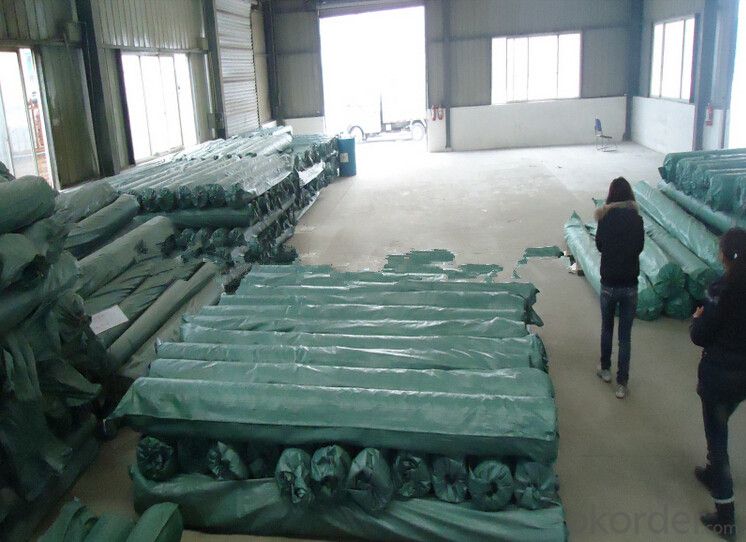
product show
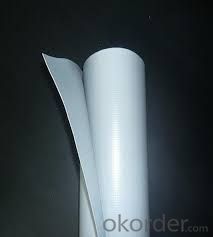
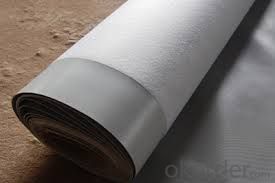
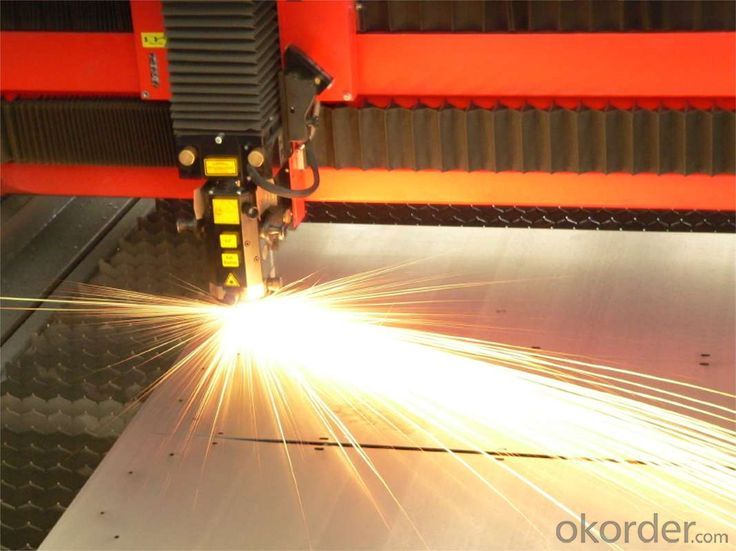
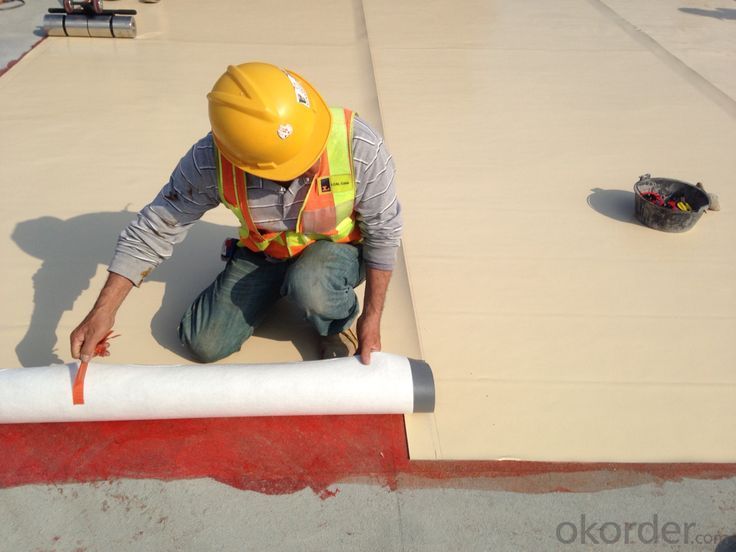
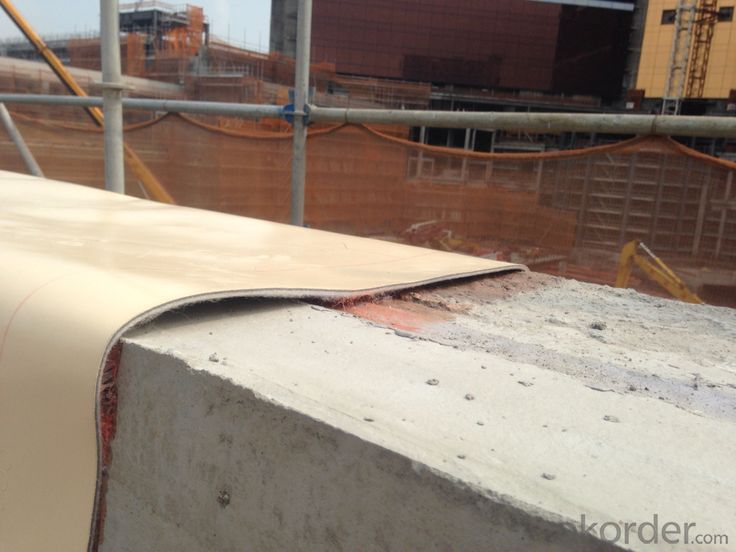
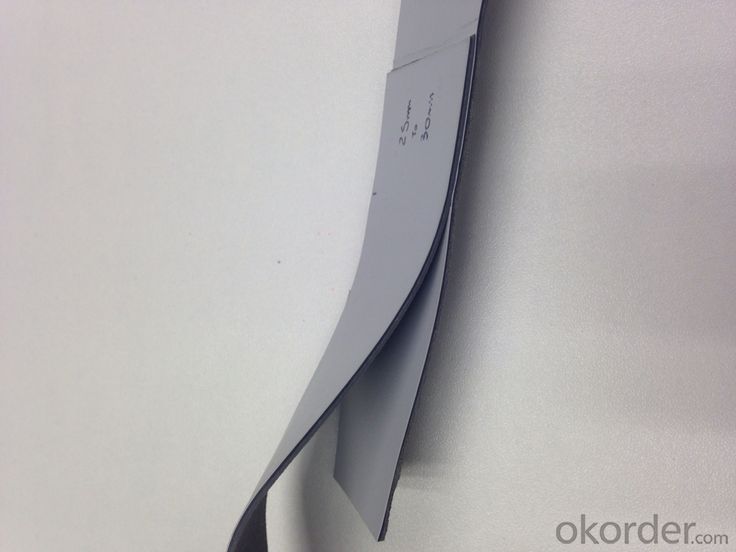
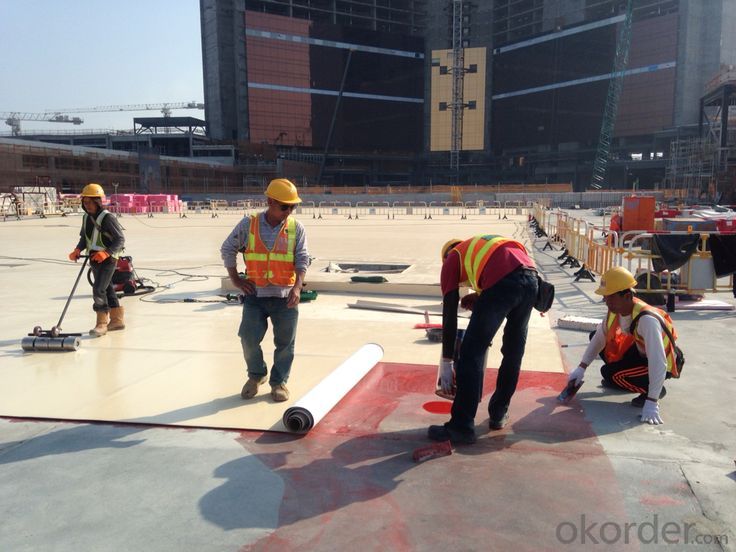
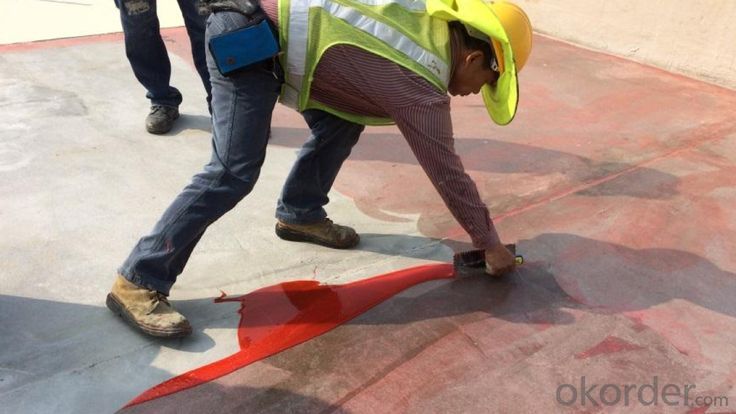
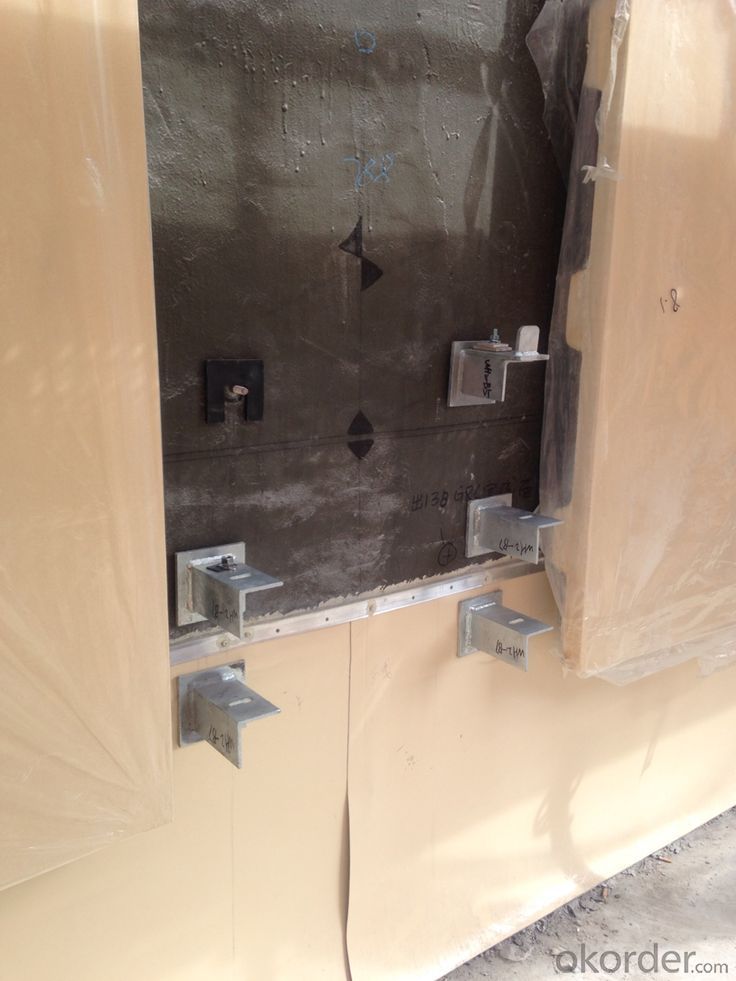
FAQ
Q: What's the delivery time ?
A: 3-5 days for 1-600 rolls, 10-15 days for container.
Q: What's the payment terms ?
A: TT/LC
Q: How do you make replacement with quality problems ?
A: New replacement will be packed into your next order or send to you directly after receive video or photo about quality problems.
- Q: Are there any specific considerations for installing a waterproofing membrane on concrete surfaces?
- Yes, there are several specific considerations when installing a waterproofing membrane on concrete surfaces. Firstly, it is important to ensure that the concrete surface is clean, dry, and free from any loose particles or contaminants. Proper surface preparation is crucial to allow for proper adhesion of the membrane. Secondly, it is essential to choose a suitable waterproofing membrane that is specifically designed for use on concrete surfaces, as different materials may have different compatibility and performance characteristics. Additionally, the correct application technique and thickness of the membrane should be followed as per the manufacturer's instructions. Finally, it is important to consider factors such as expansion joints, cracks, and structural movement, as these can affect the overall effectiveness and durability of the waterproofing system.
- Q: Can a waterproofing membrane be used on precast stainless steel surfaces?
- Yes, a waterproofing membrane can be used on precast stainless steel surfaces. The waterproofing membrane will provide an additional layer of protection against water penetration, ensuring the longevity and durability of the stainless steel surface.
- Q: Can waterproofing membranes be used on concrete tunnels?
- Yes, waterproofing membranes can be used on concrete tunnels. Waterproofing membranes are commonly used to provide a barrier against water infiltration in various structures, including concrete tunnels. These membranes, which can be made of various materials such as bitumen, PVC, or EPDM, are applied on the exterior surface of the tunnel walls to prevent water from seeping through the concrete. By creating a waterproof layer, these membranes help protect the tunnel from water damage, such as corrosion, deterioration, and leaks. Additionally, waterproofing membranes also provide a protective barrier against other potential sources of moisture, such as groundwater or surface water. It is important to ensure that the selected waterproofing membrane is suitable for the specific conditions and requirements of the concrete tunnel, taking into account factors such as the level of water pressure, chemical exposure, and temperature variations. Proper installation and regular maintenance of the waterproofing membrane are crucial to ensure its effectiveness and long-term durability in protecting the concrete tunnel from water ingress.
- Q: Where can waterproofing membranes be used?
- Waterproofing membranes have a wide range of applications across different industries. They are commonly utilized in various settings, including: 1. Building and construction: In the construction industry, waterproofing membranes are frequently employed to safeguard structures like basements, roofs, and foundations from water infiltration and subsequent damage. They effectively shield buildings against moisture-related problems such as leaks, mold formation, and deterioration. 2. Civil engineering: Waterproofing membranes are essential in civil engineering projects like tunnels, bridges, and dams to ensure water resistance and prevent water penetration. By keeping these infrastructures dry and protected, they help maintain their structural integrity. 3. Landscaping: When it comes to landscaping projects, waterproofing membranes are commonly used to prevent water from seeping into the soil and causing erosion. They are particularly useful in retaining walls, garden beds, and underground structures, as they contribute to the stability and longevity of the landscape. 4. Transportation: The transportation industry benefits from the application of waterproofing membranes, especially during the construction of roads, highways, and parking lots. By safeguarding the underlying layers from water damage, which can lead to cracks and potholes, they extend the lifespan of transportation infrastructures. 5. Industrial facilities: Many industrial facilities, such as factories, warehouses, and chemical plants, require waterproofing to protect their structures and equipment from water damage. Waterproofing membranes serve as barriers against water intrusion, preventing corrosion and preserving the longevity of these facilities. In summary, waterproofing membranes are versatile solutions that are indispensable in various sectors where water resistance and protection against moisture-related damages are crucial. They play a critical role in preserving the integrity and longevity of structures and infrastructures, thus preventing costly repairs and ensuring a safe and functional environment.
- Q: Can waterproofing membranes be used on both horizontal and vertical surfaces?
- Waterproofing membranes possess the capability to be utilized on both horizontal and vertical surfaces. These membranes have been specifically engineered to furnish a protective shield against water infiltration, and they can be implemented on a diverse array of surfaces, encompassing roofs, walls, floors, and even subterranean structures. Their application is incredibly versatile, enabling them to safeguard horizontal surfaces, such as flat roofs or balconies, while also affording protection to vertical surfaces, including walls or foundations. The adaptability and resilience of waterproofing membranes render them highly suitable for a vast spectrum of construction projects, guaranteeing that water does not permeate and inflict harm upon the structure.
- Q: Can a waterproofing membrane be used on tunnels with communication systems?
- Yes, a waterproofing membrane can be used on tunnels with communication systems. The membrane can help protect the communication systems from water damage and ensure their proper functioning.
- Q: Can a waterproofing membrane be used on tunnels with emergency exits?
- Yes, a waterproofing membrane can be used on tunnels with emergency exits. In fact, it is highly recommended to use a waterproofing membrane in such tunnels to prevent water infiltration and protect the structural integrity of the exits. Waterproofing membranes are designed to create a barrier against water and moisture, ensuring that the tunnels remain dry and free from water damage. This is especially important for emergency exits, as they need to be accessible and functional at all times. By installing a waterproofing membrane, the tunnels can be effectively protected from potential water ingress, ensuring the safety and usability of the emergency exits.
- Q: Can a waterproofing membrane be used for a parking garage?
- Yes, a waterproofing membrane can be used for a parking garage. A waterproofing membrane is designed to provide a barrier against water infiltration, protecting the underlying structure from moisture damage. In a parking garage, where exposure to water and moisture is common due to rain, snow, and vehicle fluids, a waterproofing membrane can be a crucial component of the building envelope system. It can be applied to the concrete surfaces, including the floor and walls, to prevent water from seeping into the structure and causing deterioration, corrosion, or damage to the integrity of the parking garage. Additionally, a waterproofing membrane can also help to mitigate the risk of efflorescence, mold, and mildew growth, which can be common in damp environments. Therefore, using a waterproofing membrane in a parking garage is an effective way to ensure the long-term durability and functionality of the structure.
- Q: Can a waterproofing membrane be used in showers and wet areas?
- Yes, a waterproofing membrane can definitely be used in showers and wet areas. In fact, it is highly recommended to install a waterproofing membrane in these areas to prevent water damage and leakage. A waterproofing membrane acts as a barrier between the tile or flooring and the subfloor, ensuring that any water that seeps through the surface is contained and directed towards the drains. This helps to protect the underlying structure from moisture damage, such as rotting or mold growth. Additionally, a waterproofing membrane can also help to reduce the risk of water seeping into adjacent areas and causing damage to nearby walls or floors. It is important to ensure that the waterproofing membrane is installed correctly and that all seams, corners, and penetrations are properly sealed to achieve the desired level of waterproofing.
- Q: Are waterproofing membranes resistant to alkalis?
- Yes, waterproofing membranes are generally resistant to alkalis.
Send your message to us
High Quality PVC Waterproof Membrane About 1.5mm Thickness
- Loading Port:
- Tianjin
- Payment Terms:
- TT OR LC
- Min Order Qty:
- 2000 m²
- Supply Capability:
- 10000 m²/month
OKorder Service Pledge
OKorder Financial Service
Similar products
Hot products
Hot Searches
Related keywords
